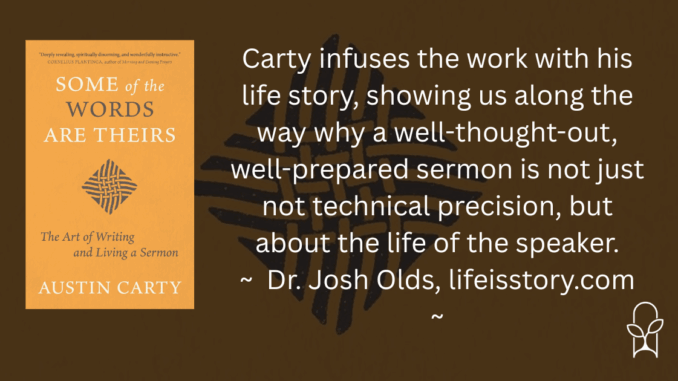
Published by Eerdmans on July 15, 2025
Genres: Non-Fiction, Christian Life, Leadership, Memoir, Writing
Buy on Amazon
Goodreads

In Some of the Words Are Theirs: The Art of Writing and Living a Sermon, Carty offers a masterclass in sermon writing that also explores the “why” driving this vocation. In so doing, he discovers how often his own sermons have been an exercise in trying to make sense of his own past, and how much autobiography lies beneath the themes he has been preaching throughout his pastoral career.
Ultimately, Carty shows how careful attention to the craft of writing a sermon—like careful attention to living a meaningful life—leads to greater self-awareness and humility. The Holy Spirit can use a preacher’s words and life in ways he or she never could have anticipated. A beautifully woven tapestry of homiletical instruction and memoir, Some of the Words Are Theirs will appeal to readers of Annie Dillard’s The Writing Life and Anne Lamott’s Bird by Bird, and to seminarians and pastors who yearn for a more holistic understanding of the craft of sermon writing.
Throughout my adult life as someone involved in ministry, I’ve struggled with the fact that I would consider my primary ministry identity as a preacher. I’m a good pastor. One of my academic focuses in undergraduate school was counseling and pastoral care. I’m a decent administrator. My second focus in undergrad was church administration. I’m a good theologian—that was the focus of my seminary degree. I have a doctorate in ministry leadership. But training aside, my gifting and my calling has been that of a preacher. And that has always felt maybe somewhat selfish of me, like the thing I enjoy the most and am the best at feels like the most self-focused. In Some of the Words are Theirs, Austin Carty walks readers through a deeply personal memoir/guide to sermon-writing that uses the preacher’s life not self-aggrandize, but to self-sacrifice and turn sermons into living stories that help our congregants (and us) grow closer to God.
Some of the Words are Theirs is developed in the same way that Carty would develop a sermon. Structurally, he takes you through the stages or preparation, writing, and revision with chapters on everything from rigorous research to proper punctuation. But this isn’t a nuts-and-bolts writing guide. Carty infuses the work with his life story, showing us along the way why a well-thought-out, well-prepared sermon is not just not technical precision, but about the life of the speaker.
One of the things that Carty discussed that left me pondering the longest was his belief that sermons should be personal for the congregation to which they are preached. In one place, he talks about revising sermons to be more personal and recalls how, early in his career, he often wrote generalized messages that were good for any audience. They weren’t bad sermons, but they also weren’t tailored to or written for the actual congregation to whom he would be preaching. With the rise of mega-churches, multi-campus churches, and online livestreams, I think there’s been a resurgence in this tendency to preach in generalities. Folks listening don’t actually know the speaker or their life and neither does the preacher know the stories of the people who are listening. In Some of the Words are Theirs, Carty insists on both knowing your audience and being known by your audience. This completely changes how one preaches, even what one preaches about. It’s a way of bringing the pastoral element of ministry into the preaching element.
I also appreciated the memoir element in Some of the Words are Theirs. Carty writes reflectively, getting very honest about his life story. Even though I wasn’t familiar with Carty before this book, his sharing of himself took me into his life. His preaching about preaching in the book is infused with his life story with that personal element making his writing more compelling and underscoring the point he’s trying to make about folks understanding story more easily than lecturing. This book has been a reminder for me to put myself into what I write and to seek to better know the stories of those listening.
